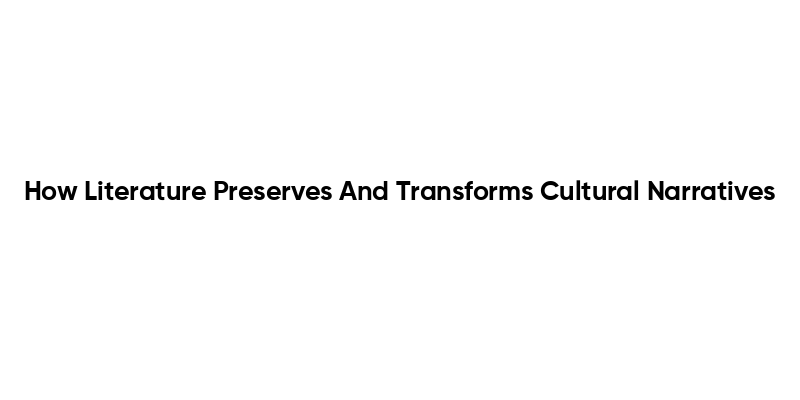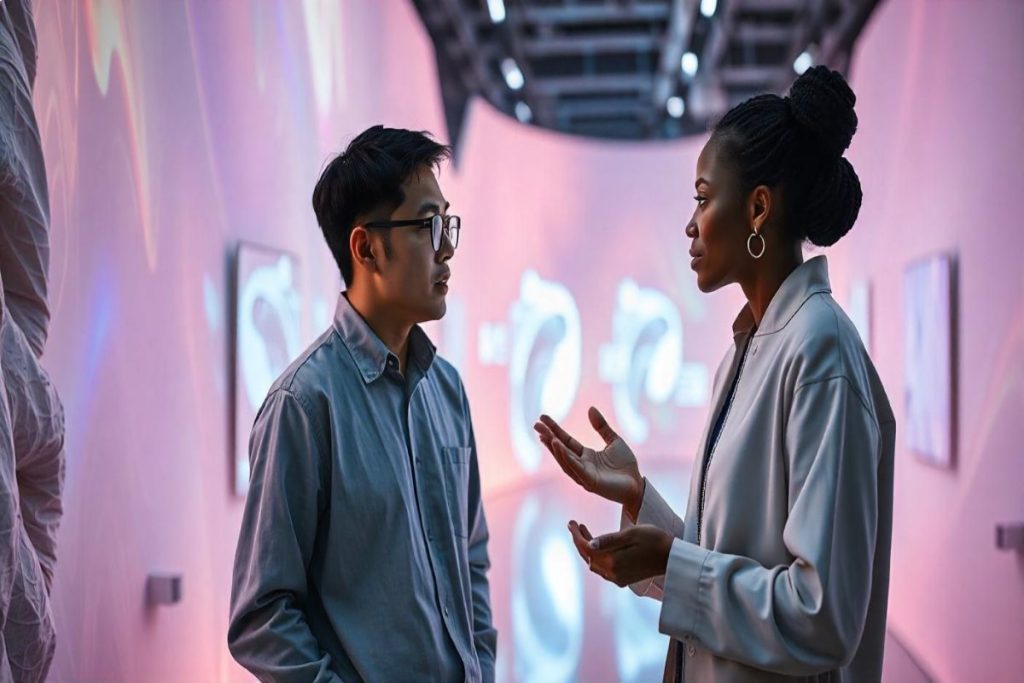Literature serves as a powerful vessel for preserving and transforming cultural narratives, acting as a mirror that reflects the values, beliefs, and experiences of societies throughout history. Through storytelling, poetry, and prose, authors capture the essence of their cultures, ensuring that the voices of the past resonate with future generations. This exploration of how literature preserves and transforms cultural narratives not only highlights the importance of literary works but also emphasizes their role in shaping collective identities and societal values.
In the following sections, we will delve deeper into the mechanisms through which literature acts as a guardian of cultural heritage. You will discover how various literary forms, from ancient epics to contemporary novels, have played a crucial role in documenting historical events and social changes. Additionally, we will examine the transformative power of literature, illustrating how narratives evolve over time to reflect shifting cultural landscapes and address contemporary issues.
As you continue reading, you will gain insights into the interplay between literature and culture, understanding how stories not only preserve the past but also inspire change and foster empathy in readers. Join us on this enlightening journey to uncover the profound impact of literature on cultural narratives and why it remains an essential part of our shared human experience.
The Role of Oral Traditions in Literature
Oral traditions have been the backbone of cultural narratives for centuries, serving as a means of preserving history, values, and beliefs. Literature often draws from these oral traditions, transforming them into written forms that can reach wider audiences. This transformation not only preserves the original narratives but also adapts them to contemporary contexts, allowing new generations to connect with their cultural heritage.
Through storytelling, literature captures the essence of oral traditions, often incorporating elements such as rhythm, repetition, and communal participation. These features enhance the narrative’s emotional impact and ensure that the cultural significance is not lost in translation. As a result, literature becomes a vessel for cultural continuity, bridging the gap between past and present.
Literature as a Reflection of Societal Changes
Literature serves as a mirror to society, reflecting the changes and challenges faced by different cultures over time. As societies evolve, so do their narratives, which are often reshaped in literature to address contemporary issues such as identity, migration, and social justice. This dynamic relationship allows literature to not only preserve cultural narratives but also to transform them in response to societal shifts.
For instance, postcolonial literature often reinterprets traditional narratives to highlight the complexities of identity and belonging in a globalized world. By doing so, it challenges dominant cultural narratives and provides a platform for marginalized voices. This transformative power of literature fosters a deeper understanding of cultural narratives and encourages critical engagement with societal issues.
The Influence of Technology on Cultural Narratives
In the digital age, technology has significantly impacted how cultural narratives are preserved and transformed. Literature is no longer confined to printed texts; it now encompasses various digital formats, including e-books, blogs, and social media. This shift has democratized access to literature, allowing diverse voices to contribute to cultural narratives and share their stories with a global audience.
Moreover, technology enables the preservation of cultural narratives through multimedia storytelling, where text, images, and audio come together to create immersive experiences. This innovative approach not only enhances engagement but also ensures that cultural narratives remain relevant in an ever-changing world. As a result, literature continues to evolve, reflecting the complexities of modern life while honoring its cultural roots.
The Interplay Between Literature and Identity
Literature plays a crucial role in shaping individual and collective identities, often serving as a means of exploring and expressing cultural heritage. Through characters, settings, and themes, literature provides insights into the values and beliefs that define a culture. This exploration of identity is particularly significant in multicultural societies, where diverse narratives coexist and interact.
By engaging with literature, readers can gain a deeper understanding of their own identities and the cultural narratives that influence them. This process of self-discovery is essential for fostering empathy and appreciation for different cultures. As literature continues to evolve, it remains a powerful tool for negotiating identity and cultural belonging in an increasingly interconnected world.
The Future of Cultural Narratives in Literature
As we look to the future, the preservation and transformation of cultural narratives in literature will likely continue to evolve alongside societal changes. Emerging trends such as globalization, climate change, and technological advancements will shape the narratives that authors choose to explore. Literature will remain a vital space for dialogue and reflection, allowing cultures to adapt and respond to new challenges.
Furthermore, the rise of diverse voices in literature promises to enrich cultural narratives, offering fresh perspectives and experiences. This inclusivity will not only preserve existing narratives but also transform them, ensuring that literature remains a dynamic and relevant reflection of the human experience. As we embrace the future, literature will undoubtedly play a pivotal role in shaping and preserving the cultural narratives that define us.
| Aspect | Description |
|---|---|
| Preservation of Culture | Literature serves as a repository of cultural values, beliefs, and traditions, capturing the essence of a society at a particular time. Through storytelling, oral traditions, and written texts, literature preserves the historical context and cultural identity of communities. |
| Transformation of Narratives | As societies evolve, literature reflects and influences changes in cultural narratives. Authors reinterpret traditional stories, infusing them with contemporary themes and perspectives, thus transforming the original narratives to resonate with modern audiences. |
| Representation of Diverse Voices | Literature amplifies marginalized voices and perspectives, challenging dominant cultural narratives. By including diverse experiences, literature enriches the cultural tapestry and fosters empathy and understanding among different groups. |
| Critical Reflection | Literature encourages critical thinking about cultural norms and values. Through satire, allegory, and other literary devices, authors critique societal issues, prompting readers to reflect on their own cultural narratives and consider alternative viewpoints. |
| Intertextuality | Literature often references and builds upon existing texts, creating a dialogue between past and present narratives. This intertextuality allows for the reinterpretation of cultural stories, ensuring their relevance across generations. |
| Globalization and Cultural Exchange | In an increasingly interconnected world, literature facilitates cultural exchange, blending narratives from different cultures. This fusion can lead to the creation of hybrid narratives that reflect a globalized perspective while still honoring local traditions. |



